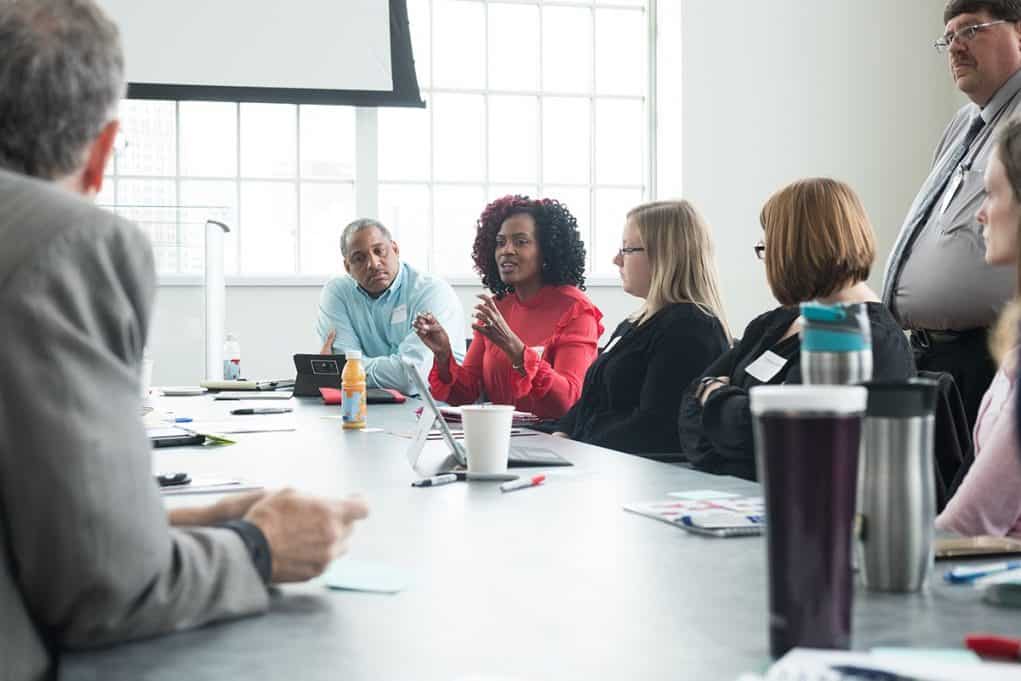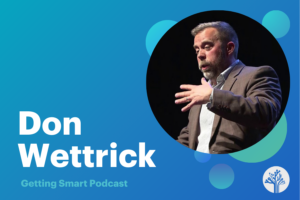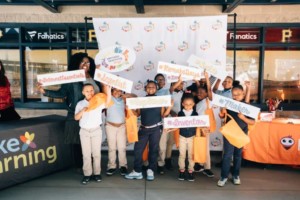Remake Learning: A Regional Carnival of Learning

Pittsburgh has emerged as one of the most interesting learning ecosystems in the country. Powered by great universities and invigorated by the Remake Learning (@RemakeLearning) network, the region is a collaborative carnival of learning.
Two recent conferences, #PGHCareerReady and #EdResearchSummit, created the opportunity to visit with dozens of learning partners and school district leaders. For the next few weeks we’ll be featuring highlights in the #RemakeLearning series.
Remake Backstory
Remake Learning is a loose network of 250 organizations including schools, 67 districts, universities, libraries, startups, nonprofits, and museums–all focused on engaging, relevant and equitable learning:
- Engaging: Learners have the time, resources, support, environment, and encouragement to be active problem-solvers, creators, innovators, advocates, and citizens.
- Relevant: Resonates with today’s learner’s interests, culture, context, community, identity, abilities, and experiences. Boosts future ready skills like creativity, problem-solving, critical thinking, and collaboration will be increasingly salient.
- Equitable: More supports and opportunities are afforded to those of greatest need.
Starting with a Grable Foundation pancake breakfast in 2007, the initiative grew quickly. After a few years, the Sprout Fund took over management of the network providing mini-grants and hosting networking activities. Benedum, MacArthur, Hillman, McCune and Chevron Foundation joined as funders. Philanthropies, businesses and governments pledged more than $25 million of investment. In 2017, Remake Learning became a fully staffed entity supporting a network of partners, initiatives, strategic planning, communication and policy efforts.
Remake Learning is really a network of collaborative networks. Working groups focus on STEM, Computer Science for All (CS4All), maker, professional learning and policy. District leaders share ideas and resources.
Six Pittsburgh area districts are also members of the League of Innovative Schools:
Avonworth, Baldwin-Whitehall, Elizabeth Forward, Fox Chapel, Montour, and South Fayette. The spirit of collaboration between these districts is unusually high. They share resources with each other, regional partners, and numerous visitors.
Updating Career Readiness
At the Remake Learning convening on career readiness (#PGHCareerReady) I talked about the #FutureofWork, the conclusions of our #AskAboutAI investigation and what graduates should know and be able to do. In short:
- The combo of big data, artificial intelligence, and enabling technologies have created an unprecedented rate of change. Add the predictable and unpredictable implications of urbanization, globalization and automation and young people will experience an enormous amount of change–maybe 10x more than seniors like me.
- There will be waves of job loss in every region. Some regions that skill up for the automation economy will offset those losses with new job creation.
- Schools should prioritize design thinking and social and emotional learning as core skills for approaching complex adaptive challenges. Developing these skills take extended and integrated challenges–and for many schools that requires new structures, schedules, skills and supports.
- Tech is evolving faster than civic infrastructure resulting in a back log of tough issues starting with growing income inequality. Young people need the basics of civic and social change leadership. Schools can convene community conversations that build readiness and resilience.

Jason Swanson (@jasonswanson), KnowledgeWorks Foundation, talked about the rise of the smart machine. The co-author of The Future of Learning: Redefining Readiness from the Inside Out described how the way we work and how we organize work is changing. Most careers look less like a ladder and more like a mosaic.
Changes in the employment landscape requires us to #RedefineReady said Swanson. In education that means moving past the historical focus on mastering content, the current focus on thinking and doing, to a #FutureEd focus on feeling and relating. The KnowledgeWorks report places social and emotional learning at the heart of the new graduate profile.

Boosting business and community involvement. “It’s all about talent,” said Laura Fisher, Allegheny Conference on Community Development. Businesses get that but only one in 10 employers are engaged with schools. Fisher says the primary reason is that businesses don’t know how to engage.
Complicating involvement is the velocity of change and employee mobility. About 30 million Americans have jobs that didn’t exist until recently, added Fisher. More than half of the workforce has less than five years of job tenure. A third of the labor force is changing jobs every year. Most young people will have 10 or 15 jobs before they are 40 years old.
The good news is that business leaders are consistent and clear about what they’re looking for in graduates: communication, critical thinking, and interpersonal skills. On #FutureofWork skills, surveyed southwest Pennsylvania CEOs said they’re most worried about behavioral skills leadership, customer-service orientation, and agile and nimble learners.
Susie Puskar, Partner4Work, talked about capitalizing on out-of-school time. Susie leads a workforce development organization that connects funding, expertise, and opportunities to develop a thriving workforce in the Pittsburgh region. Over 7,000 youth in Pittsburgh received work-based learning experiences in out-of-school time through support provided by Partner4Work. She advocates for and supports work-based learning that is relevant to youth and business.
Big shifts in practice. Briana Mihok, University of Pittsburgh Institute of Politics, discussed recommendations from her paper Moving Beyond 20th Century Education: Emerging Trends in CTE and Project-based Learning including:
- Increase career pathways (example: Ohio Engineering and Science Tech Pathway).
- Increase access to high quality project-based learning.
- Increase access to job shadowing, internships, and career exploration.
- Incentivizing dual enrollment especially early college high schools.
- Create career and technical centers that respond quickly to workforce needs.
- Increase access to and incentives for business/community partnerships.
- Enable school and program flexibility.
“Recognizing that those jobs that exist today might well disappear in the future due to automation, technological changes, and other factors, schools must design CTE and project-based learning programs that address current workforce needs as well as prepare students for the lifetime of learning that will be necessary to adapt to labor market changes,” said Mihok.
Linda Hippert spoke about improving school system practices. Dr. Hippert leads the Allegheny Intermediate Unit. She highlighted the state standards for career education and work (benchmarks for grades 5, 8, and 11) including career awareness, preparation, acquisition, retention, and advancement (including a little entrepreneurship). High school students are required to have a guidance plan.
Among the many community partners exhibiting at the conference was Chatham University, a leader in sustainability education (with a smart farm). The entrepreneurial university partners with networks like Propel Schools for quality accelerated teacher preparation.
Forums like this in the Pittsburgh region gather information from grassroots stakeholders in order to plan the actions, systems, and civic direction that intermediaries like Remake Learning can help address. Feedback from the regional audience included a need for:
- Communication with legislators about addressing our region’s K-12 education needs,
- Opportunities for students to explore careers,
- Connections between schools to share models,
- Awareness and information about the future of work,
- Impactful social emotional learning experiences, and
- Increased business engagement.
Stay tuned for #RemakeLearning features on South Fayette Schools, Montour Schools, Propel Schools, and Carnegie Mellon University.
And plan visit to Pittsburgh during Remake Learning Days, May 17th-26th. There will be over 300 events based in schools, businesses, universities, and communities so that families can experience first hand the future of learning.
This post is part of a blog series in the upcoming “Getting Smart on Reinventing Education” Smart Bundle produced in partnership with The Grable Foundation. Join the conversation on Twitter using #RemakeLearning.
For more see:
- South Fayette Schools: A Computational Carnival for Kids
- CMU: Pittsburgh’s Learning Engine
- Montour Schools: Home of the Evolving Educators
Stay in-the-know with all things EdTech and innovations in learning by signing up to receive the weekly Smart Update.







0 Comments
Leave a Comment
Your email address will not be published. All fields are required.